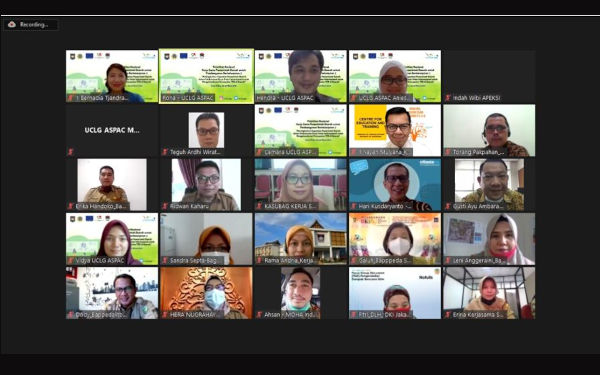In achieving the Sustainable Development Goals (SDGs), cities and local governments are at the forefront of its success. It is not only because they are bodies of government closest to communities, but, cities and local governments are equipped with adequate and specified budget, broad authority – spearheading local innovation and public services and the ability to implement public policies that serve local interests.
This is crucial as stated at the High-Level Panel of Eminent Persons for the Post-2015 Development Agenda report which reads, “Cities are where the battle for sustainable development is lost.” And amidst the global COVID-19 pandemic, local governments is facing both challenges and opportunities to push the agenda forward even in times of crisis.
One way to boost the role of local governments in promoting sustainable development is through the development of partnerships as means of mutually beneficial cooperation that will ultimately improve the welfare of local governments. For example, regional governments can start by taking the advantage of opportunities to collaborate with regional governments in other countries and improving the capacity of city and local governments to do the same.
The Indonesian Government, through Presidential Regulation No. 59 of 2017 has mandated SDGs National and Regional Action Plans (RAN/RAD), making local governments as a foundation for communities to solve its problems effectively and efficiently. In Indonesia, these problems are varies from poverty, sanitation, housing, health, spatial planning as well as inequality income distribution.
To expand opportunities and improve capacity of local governments in the Asia-Pacific for international collaboration, LOCALISE SDGs – a collaborative project of UCLG ASPAC and APEKSI (Association of Indonesian Municipalities) held a three-day National City Diplomacy Training from 29th to 31st March 2021, titled “Improving the Capacity of Local Governments in Implementing International Cooperation to Accelerate the Achievement of SDGs in the Local Level.”
It aims to provide knowledge and skills for local governments in building international cooperation, which strategically seeks to participate in achieving all SDGs goals in the spirit of mutually beneficial cooperation based on equality. The training also facilitates knowledge sharing on building international cooperation in accordance with applicable laws and regulations. It helps local governments in improving diplomacy and negotiation efforts to realise sustainable local development.
The target participants of the training were the Indonesian local governments under the LOCALISE SDGs programme and members of UCLG ASPAC which have expressed political commitment in implementing 2030 Agenda through regional and international cooperation.
In the opening session, Dr. Bernadia Irawati Tjandradewi as Secretary General of UCLG ASPAC positively encouraged participants to take into consideration the strategic benefits of international cooperation not just between local governments but also with other actors. “International cooperation is very useful for policy changes and improvements, however, it is not just limited to that. There is also opportunities for peer-to-peer learning, share of best practices among local governments and partnerships with other actors, the private sector and even academic institutions.” She addressed that when done effectively, reciprocity through city networks and between cities can grow even better, particularly in the efforts of achieving the Sustainable Development Goals (SDGs).
“The ultimate goal of this training is to increase the capacity of the local governments, because nearly 70 percent of the local governments and governments’ municipalities have developed international cooperation, both sister cities and others, which can accelerate better SDGs achievement,” she added.
Mr. Bima Arya Sugiarto as Chairperson of the APEKSI Executive Board and Mayor of Bogor City highlighted some specific points related to international cooperation. City and local governments are always at the core of cooperation, yet it is not always maximised to which this training could provide more information, particularly in tackling many obstacles.
First is improving the understanding of the development ideology itself, as it would not be useful for regional heads to talk technically about derivatives of all SDGs goals, as well as international cooperation without wholesome knowledge on what development is.
Second is building communication among local governments in Indonesia to ensure synchronisation as there is a global plan, a national plan, a provincial plan and the Regional Medium Term Development Plan or RPJMD at the local level. This communication and understanding needs to happen first before executing effective international cooperation.
“The third point is that we (as local governments) need to stay updated on latest news related to international development so we will be up to date when forging international cooperation, to allow for effective benchmarking and such,” he said.
Mr. Bima then highlighted the importance of continuous capacity building, starting from theoretical knowledge to implementation so that local governments can build mutually reinforcing networks, expand support system and open up not only funding but other spaces to improve, such as planning scenarios.
“Networking is what makes cities independent from fully relying on, for example, the APBD (Local Government Budget). Once again, this networking should not be limited to funding as there are many types of collaborations that can be measured in the long term to spread the spirit of synergy,” he added.
The training also appointed Dr. Yayan Ganda Hayat Mulyana, Head of the Centre for Education and Training for the Ministry of Foreign Affairs as speaker and resource person to facilitate the three days training.
By KM Team
—
This City Diplomacy Training is part of the LOCALISE SDGs programme. UCLG ASPAC collaborates with APEKSI in this programme, which is funded by the European Union with involving nearly 40 local governments and 16 provincial governments in Indonesia.
For more information related to LOCALISE SDGs, please visit: http://localisesdgs-indonesia.org











